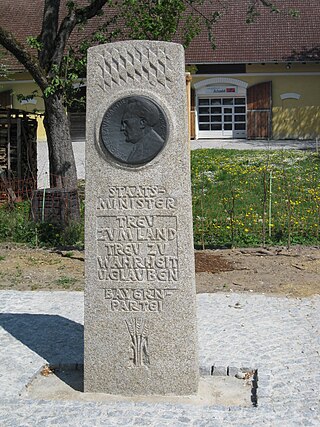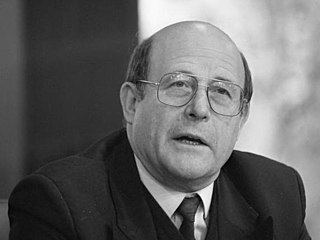Related Research Articles

The Christian Social Union in Bavaria is a Christian democratic and conservative political party in Germany. Having a regionalist identity, the CSU operates only in Bavaria while its larger counterpart, the Christian Democratic Union (CDU), operates in the other fifteen states of Germany. It differs from the CDU by being somewhat more conservative in social matters, following Catholic social teaching. The CSU is considered the de facto successor of the Weimar-era Catholic Bavarian People's Party.

Wilhelm Johann Harald Hoegner was the second Bavarian minister-president after World War II, and the father of the Bavarian constitution. He has been the only Social Democrat to hold this office since 1920.

The Landtag of Bavaria, officially known in English as the Bavarian State Parliament, is the unicameral legislature of the German state of Bavaria. The parliament meets in the Maximilianeum in Munich.

Thomas Dehler was a German politician. He was the Federal Republic of Germany's first Minister of Justice (1949–1953) and chairman of Free Democratic Party (1954–1957).

Hans Ehard was a German lawyer and politician, a member of the Christian Social Union (CSU) party.
Bavaria, one of the states of Germany, has a multiparty system dominated by the Christian Social Union in Bavaria (CSU). Bavaria has long been a bastion of conservative politics in Germany, with the Christian Social Union has won every election of the state parliament since 1946 and having almost a monopoly on power. Every Minister-President since 1957 has been a member of this party. On the other hand the bigger and more liberal, or rather social democratic, cities, especially Munich, have been governed for decades by the Social Democratic Party of Germany (SPD) until recently the second biggest party. In 2018 the Alliance 90/The Greens which have been represented in the state parliament since 1986, became the second biggest political party in the Landtag and in 2020 the biggest party in the Munich City Council. From the historical point of view, older Bavaria was one of the most liberal, predominantly Roman Catholic states until the rather rural areas of Swabia and Franconia were added in 1814/15 at the Congress of Vienna.

Franz Wendelin "Hanns" Seidel was a German politician who served as Minister-President of Bavaria from 1957 to 1960. He was a member, and from 1955 to 1961 chairman, of the Christian Social Union of Bavaria.

The Schweinfurt–Meiningen railway, route number 5240, is a single-tracked main line in the states of Bavaria and Saxony in southern Germany. It is also called the Main-Rhön-Bahn and is listed in the Deutsche Bahn timetable as route (Kursbuchstrecke) 815. The railway has been part of the Erfurt–Schweinfurt route since 1993. Passenger services on the line are provided by DB Regio and the Erfurter Bahn (EB).

Joseph Baumgartner was a German politician, representative of the Christian Social Union of Bavaria, Bavarian People's Party and the Bavaria Party.

Wolfgang Bötsch was a German politician, representative of the Christian Social Union in Bavaria (CSU). Between 1974 and 1976 he represented the Landtag of Bavaria. From 1976 to 2005 he was a member of the Bundestag, and between 1993 and 1997 he was the last Minister of Post and Telecommunications. Bötsch died on 14 October 2017 at the age of 79.

The Bavarian Ministry of the Interior, Sport and Integration is the interior ministry of Bavaria. It is headquartered in Munich, and was established on November 21, 1806 as the Departement des Innern. The first Minister of the Interior was Count Maximilian von Montgelas.

Joachim Herrmann is a German politician. He is a member of the CSU party. Herrmann is an MP in the Landtag, the parliament of Bavaria since 1994. Since 16 October 2007 he has been Minister of the Interior of the state of Bavaria.

The Untermainkreis was one of the administrative districts of the Kingdom of Bavaria between 1806 and 1837 named after its main river Main. It was the predecessor of the administrative district of Lower Franconia. Administrative headquarters were in Würzburg.

The 2018 Bavarian state election took place on 14 October 2018 to elect the 180 members of the 18th Landtag of Bavaria. The outgoing government was a majority of the Christian Social Union in Bavaria (CSU), led by Minister President Markus Söder.

The December 1946 Bavarian state election was held on 1 December 1946 to elect the members of the First Bavarian Landtag. The election came after the dissolution of the Bavarian Constituent Assembly after the passing of the Constitution, which stipulated that a democratically elected Landtag would elect the Minister-President. It saw Bavaria's first democratically chosen Minister-President since Heinrich Held.

The 1950 Bavarian state election was held on 26 November 1950 to elect the members of the 2nd Landtag of Bavaria. The outgoing government was a majority of the Christian Social Union (CSU) led by Minister-President Hans Ehard.

The 1954 Bavarian state election was held on 28 November 1954 to elect the members of the Third Bavarian Landtag. It is notable for being both the only time that a member of the SPD was elected as Minister-President, and the only time that the CSU was in the opposition.

The 1958 Bavarian state election was held on 23 November 1958 to elect the members of the Fourth Bavarian Landtag, and was notable for being held in the midst of the Casino Affair, which indicted several Bavarian politicians in the previous government on charges of corruption.
The Bavaria casino scandal refers to the political intrigue in Bavaria, Germany following the Bavarian Landtag's decision to issue casino licenses to private individuals between 1955 and 1962. Accusations of corruption decimated the Bavaria Party, which has been shut out of the Landtag since 1966.

The 2023 Bavarian state election was held on 8 October 2023 to elect the members of the 19th Landtag of Bavaria. The outgoing government was a coalition of the Christian Social Union in Bavaria (CSU) and the Free Voters of Bavaria (FW) led by Minister-President of Bavaria Markus Söder. The 2023 Hessian state election was held the same day.